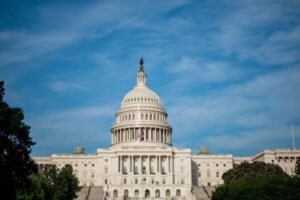The Debt Ceiling Suspension: Implications for Alternative Asset Investors
Following the recent debt ceiling suspension in the U.S., the Treasury now has the ability to meet the federal government’s payment obligations. As an alternative asset investment specialist, I can tell you this development may hold significant implications for investors. Let’s delve into this a bit more.
Understanding the Debt Ceiling Suspension
The U.S. Treasury warned it would run out of funds if Congress did not act to suspend the debt ceiling. But with the suspension in place, the Treasury can now make an estimated $92 billion in payments and transfers this week, including a significant $36 billion change to the Social Security and Medicare trust funds.
The debt ceiling suspension has allowed the Treasury to carry out its planned auction schedule for total borrowings of $726 billion in the April-June quarter. This plan assumes an end-June cash balance of $550 billion, with anticipated borrowing of $733 billion in the July-September quarter for an end-September cash balance of $600 billion.

Implications for Investors
For alternative asset investors, this development could bring some welcome reassurance and opportunities:
Market Stability: The suspension of the debt ceiling averts a potential default on U.S. government debt1, thereby maintaining overall market stability. This is beneficial for all investors, as it removes a significant source of uncertainty.
Impact on Interest Rates: The borrowing activities of the Treasury could impact interest rates, influencing the returns from alternative assets like real estate and private equity.
For example, consider real estate investments. If interest rates rise, the cost of borrowing for property purchases also increases, potentially lowering demand for real estate and depressing property prices. This could negatively affect real estate investors who are looking to sell their properties. For private equity investments, higher interest rates could mean that companies in which these investments are made have higher costs of borrowing. This could impact their profitability and, consequently, the returns for private equity investors.
Secondary Market Opportunities: Investors in the secondary market could see enhanced liquidity and potential profit opportunities, given the Treasury’s borrowing activities.
In the MCA secondary market, investors buy and sell existing MCAs. This market allows original MCA providers to sell off part of their portfolio to other investors, thereby reducing their risk and freeing up capital for further advances.
In a scenario where the Treasury’s borrowing activities lead to increased interest rates, businesses may find traditional loans more expensive. As a result, they could turn to MCAs, which might offer more accessible funding. This could lead to an increase in the demand for MCAs, resulting in more activity and potentially higher prices in the MCA secondary market. For investors, this could mean more opportunities for buying and selling MCAs and potentially higher returns.

In sum
Overall, the suspension of the U.S. debt ceiling can be seen as a positive development for alternative asset investors, providing both stability and potential investment opportunities. However, it’s always crucial for investors to continue to monitor the broader economic context, and how changes such as this might impact their specific investments.
You can get started with adding MCAs to your portfolio here.
